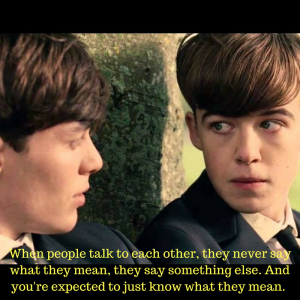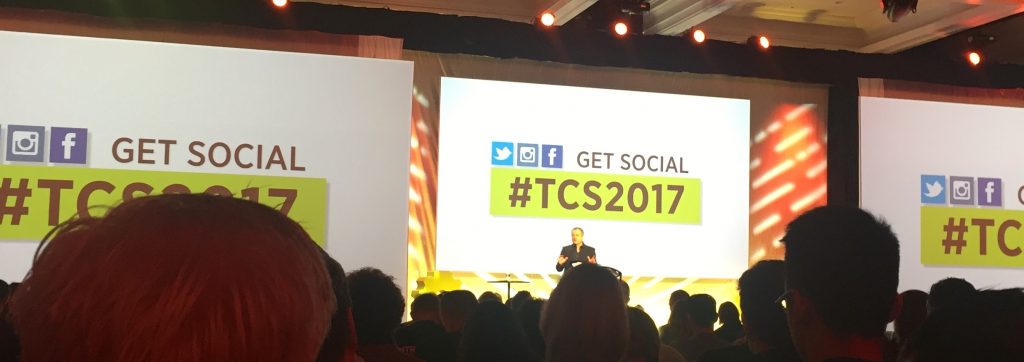One of my favorite movies is The Imitation Game.
“When people talk to each other, they never say what they mean, they say something else. And you’re expected to just know what they mean.”
Great marketing lesson.
That’s why I advocate listening to what people don’t say.
And one of the things people don’t say is their invisible scripts…Because they’re invisible.
Invisible Scripts: Assumptions you’ve made about how the world works that influence your perception and behavior.
- Working at a corporation is a more responsible thing to do.
- You’re not *really* an adult unless you own a home.
- If you went to Harvard, you’re extremely smart.
- People who move back in with their parents are failures.
- It’s important to be liked.
- I’ll be happy if I make more money.
- Healthy couples never fight.
- Being busy means I’m important.
- I am a bad person if I don’t call my grandmother.
They’re beliefs we hold about the world around us that we never think to question.
One particularly damaging invisible script comes out of awesome movies like The Imitation Game. It’s also in A Beautiful Mind. Centerstage. The Queen of Katwe. The Hundred Foot Journey. And that new series out about Albert Einstein, Genius.
The script goes:
“One day, my genius will be discovered.”
I hate this one.
No.
No, it won’t.
I know what you’re thinking. “Obviously, it’s not real life, Margo, it’s fiction. We know the difference.”
I don’t think you do.
Most of us don’t. I mean, we say we do in public. And our brain technically “knows” the difference. But when we’re home alone feeling sorry for ourselves, we’re thinking, “Why can’t my life be like FICTIONAL CHARACTER” “My life would be so easy IF…” And our brain goes into fantasy land.
Even if we know isn’t true, it still makes us feel like crap.
[If you want to geek out on this topic A Cognitive Psychology of Mass Communication is a fantastic textbook. Yes, textbook. Yes, an affiliate link.]
Which is why I hate the genius narrative.
This “myth of discovery” leads good people to sit and wait.
Wait to be discovered. Wait to be chosen. “If it was meant to be,” the script says, “someone would recognize my genius!”
Hogwash.
No one is going to pick you.
Only you can choose you.
I’m not done ranting yet.
The premise that you have to be a genius to be discovered is also problematic. Let’s be honest, we’re all mostly B+ players and not geniuses. (Sorry…but you sorta suspected it didn’t you?)(Don’t worry, you’re not alone, you’re the majority. You’re smart. Just not genius smart. You probably have a life too. And many fantastic and wonderful redeeming qualities that geniuses don’t have IRL, but do in movies.)
According to this genius narrative, you’ll never be discovered because there is nothing spectacular to discover.
You’re left out of the narrative completely.
Which is crap.
If you’re a regular illiterate person born in the slums of Uganda like the Queen of Katwe – you’re just screwed? That’s a $#@^&y message to send to the rest of us.
I prefer the message that is backed by science: Grit > Talent. Thank you, Angela Duckworth. (I have not read her book, but am told it’s wonderful. I did hear her interviewed, many times, and she was wonderful).
Perseverance. Mental fortitude. Willingness to get back up after being pushed down. Determination.
Those are the things that set you apart IRL.
[Before I get angry emails, of course, you need some talent. I will never be a famous singer because I cannot sing. But if you can sing, don’t wait to be discovered. Practice your buns off and build yourself an audience.]
The genius narrative is: “extremely underprivileged circumstance, extreme talent, gets discovered, life changes forever.” THAT NARRATIVE SUCKS.
It puts all your power in the hands of someone else.
There’s a much better narrative.
The Hero’s Journey: “Ordinary person is faced with extraordinary circumstances and rises to the occasion despite odds against him.”
(You see this one in movies like Star Wars, the Lego Movie, Titanic, and, of course, The actual Bible (Prince of Egypt, anyone?))
When you are sitting alone at home feeling like crap about your accomplishments, compare yourself to the Hero’s journey, not the genius one.
Successful people don’t wait to be chosen. They choose themselves (to steal the phrase from Altucher).
Determine your own future.
/rant.
– Margo





